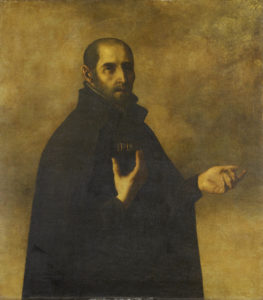We're back for an ENTIRE WEEK OF THE SAINTLY SIXTEEN! Yes, there's a parallel basketball tournament going on that some folks -- even many in our ranks -- think is "sweet" or "elite." But over here, it's saintly and elate. (For the college basketball aficionados among us, be honest. How many times have you accidentally referred to your other brackets by the wrong name?)
Last week we kicked off the Saintly Sixteen with Martha of Bethany and William Wilberforce becoming the first two saintly souls to reach the Elate Eight. Today Ignatius of Loyola and Marina the Monk wrangle in an attempt to join them.
Don't forget, to head over to the Bracket tab to refresh your memory on the first round matchups and the basic biographical information presented in the Round of 32. For instance, you can easily reference Ignatius' victory Tikhon of Zadonsk or Marina's win against Dominic before casting your vote today. Remember, the informed voter is the wise voter.
Look for Tim and Scott's latest life-changing episode of Monday Madness coming later today. Can't wait? Well, patience is apparently a virtue. In the meantime, go vote!
Ignatius of Loyola
 “Up to the age of twenty-six [Ignatius of Loyola] was a man given to the vanities of the world; and what he enjoyed most was warlike sport, with a great and foolish desire to win fame.” This assessment of Ignatius’ early life didn’t come from a disapproving biographer, but from the pen of Ignatius himself, in the opening line of his Autobiography. Ignatius wrote this in the last of his major writings, having experienced for himself the transformative power of living life aligned with God’s loving purposes.
“Up to the age of twenty-six [Ignatius of Loyola] was a man given to the vanities of the world; and what he enjoyed most was warlike sport, with a great and foolish desire to win fame.” This assessment of Ignatius’ early life didn’t come from a disapproving biographer, but from the pen of Ignatius himself, in the opening line of his Autobiography. Ignatius wrote this in the last of his major writings, having experienced for himself the transformative power of living life aligned with God’s loving purposes.
Ignatian spirituality, and most especially Ignatius’ Spiritual Exercises, have served as a template for millions of retreatants through the centuries who seek to encounter God in all things. Ignatius begins the exercises with his understanding of our purpose, and how we can live a life to the greater glory of God: “Human beings are created to praise, reverence, and serve God our Lord, and by means of this to save their souls… I ought to desire and elect only the thing which is more conducive to the end for which I am created.” The Spiritual Exercisesare a guided template for responding to the call of God.
But they aren’t a glorified quiet day. Ignatius sought not to develop cloistered monks, but contemplatives in action – “love ought to manifest itself more by deeds than by words,” he writes. The Exercises don’t just lead a retreatant through a series of guided contemplations on the life of Jesus – but actively encourage her to imagine herself in the scenes of Jesus’ life and ministry. The Exercises don’t direct a retreatant to simply listen for God in silence – but also to see how God speaks to him through his desires when considered in the light of the immense love of God: “Ask for what [you] desire… ask for interior knowledge of all the great good [you] have received, in order that, stirred to profound gratitude, [you] may become able to love and serve his Divine Majesty in all things.” Here is the core of Ignatian spirituality: finding and serving God in all things.
Having experienced the profound love of God, and desiring to offer ourselves to God’s redemptive purposes in this world, in the final week of the Spiritual Exercises, Ignatius offers this prayer for us to use in offering ourselves for God’s purposes:
“Take, Lord, and receive all my liberty, my memory, my understanding, and all my will – all that I have and possess. You, Lord, have given all that to me. I now give it back to you, O Lord. All of it is yours. Dispose of it according to your will. Give me your love and your grace, for that is enough for me.”
Marina the Monk
 Marina the Monk wasn’t one of those saints who left behind volumes of theological writings and letters.
Marina the Monk wasn’t one of those saints who left behind volumes of theological writings and letters.
But some legends say Marina the Monk, known by the male name Marinos to the other monks at the Monastery of Qannoubine in Lebanon, left behind a note as the saint lay dying. It read: “I am a woman and not a man. I embraced the monastic life with my father. I was falsely accused. I have raised this child with my care. I beg of you not to remove my habit, my brothers.”
That’s a short summary of the saint’s life. Others have found many more words to say about it.
Some admire Marina as a feminist hero who didn’t let the limitations of 5th century society stand in the way of her calling. Shaving her head, dressing as a man and taking a male name allowed the saint and other women who followed her “to enter an exclusively male dominated part of their faith that also happened to have been the ideal, Coptic ascetic way of living,” according to Madeléne Tjernqvist in the paper “Woman Monks of Coptic and Christian Hagiography.”
Others admire Marinos as the first transgender saint who set the bar for those who followed him. “Rooted in the origins of the early Church, Marinos becomes a narrative and material foundation for later trans saints to be built upon. On this rock, Christ builds his transgender church,” writes Dr. M.W. Bychowski, Ph.D, on the website Transliterature.
Some identify with Marina the Monk because they have been similarly misjudged, and some are inspired by Marina the Monk’s care for the child who the saint was falsely accused of fathering.
Biographer Guita Hourani called Marina the Monk “a model monk.”
“She is described as a strong person who persevered under harsh physical and emotional circumstances in order to follow the life she had chosen. She endures in silence both the cruel judgment of people and the hard conditions of ascetic living,” writes Hourani in The Journal of Maronite Studies. “In life, she was a living martyr; in death, she was a saint!”
There are some secrets the saint took to the grave — and legends about what happened afterward. One legend has another monk being cured of blindness when he approached the body of the saint. Another has the birth parents of Marina the Monk’s child driven to the saint’s gravesite, where they confessed to falsely accusing Brother Marinos of fathering the child.
Whatever it is you see in the saint’s life that inspires you, a later poet composed these thoughts: “Hence we see in Saint Marina a proof. She has gained the glory of joy through grace-filled patience.”
[poll id="257"]
Ignatius: Ignatius of Loyola by Francisco Zurbaran (1598-1664). Public Domain.